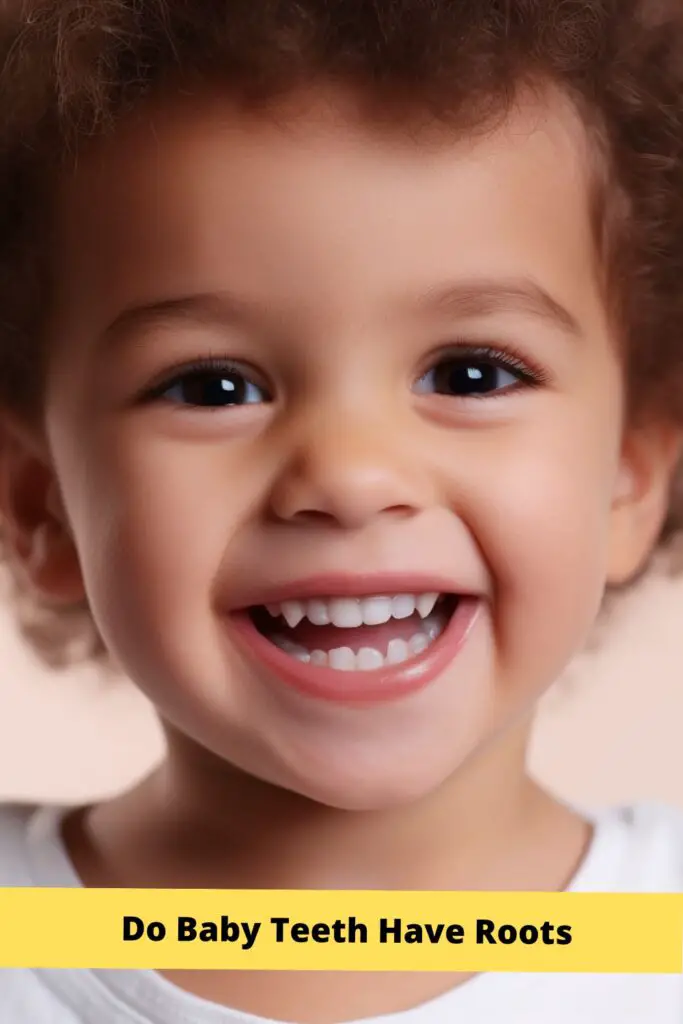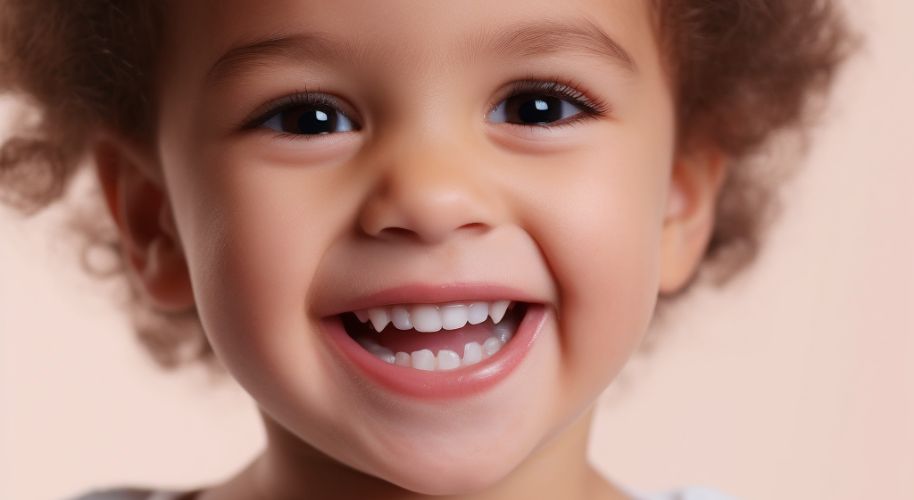Last Updated on June 5, 2025
While the tooth fairy may only be interested in the crown of your child’s lost tooth, the story beneath the gum line is equally captivating. Baby teeth, also known as primary teeth, are crucial to your child’s oral health and overall development. But what lies beneath these tiny pearly whites? Do they have roots like their adult counterparts?
In this blog post, we’ll delve into the captivating world of baby teeth, exploring their structure, function, and the intriguing question of whether or not they have roots. So, brace yourself for an insightful journey that will change how you view your child’s adorable smile!

Teething Truths: Do Baby Teeth Have Roots?
Yes, baby teeth do indeed have roots. Similar to permanent teeth, baby teeth have crowns (the part you see in the mouth) and roots that hold the teeth in place within the jaw.
However, as a child’s mouth grows and the permanent teeth start to push through the gums, the roots of the baby teeth begin to dissolve in a process known as resorption. This allows the baby teeth to eventually become loose and fall out, making way for permanent teeth.
When a baby tooth falls out naturally, you typically only see the crown—the above-gum portion of the tooth—because the root has already been resorbed and is no longer present. That’s why many people mistakenly believe that baby teeth don’t have roots.
If a baby tooth is knocked out prematurely due to an accident, the root may still be attached, so it’s important to seek immediate dental attention.
The Importance of Roots in Baby Teeth
The roots of baby teeth, though shorter and more delicate than those of adult teeth, hold significant importance in a child’s oral development and overall well-being. Here’s why the roots of baby teeth matter:
The Roots Hold Baby Teeth in Place
Just like adult teeth, the roots of baby teeth are responsible for anchoring them securely in the jaw. They provide stability and ensure that the teeth can perform their functions effectively, such as biting and chewing food.
Roots Guide The Growth of Permanent Teeth
The roots of baby teeth play a critical role in guiding the growth of permanent teeth. They serve as placeholders, ensuring that the adult teeth grow into their correct positions. Thus, they help maintain proper alignment and spacing of the adult teeth.
Roots Facilitate Natural Tooth Loss Process
In a natural process known as resorption or dialysis, the roots of baby teeth get absorbed back into the body as the adult teeth emerge. This process is essential for allowing baby teeth to become loose and eventually fall out to make way for permanent teeth.
Roots Prevent Premature Space Loss
By remaining in place until the permanent tooth is ready to erupt, the roots of the baby teeth prevent premature space loss. This is crucial as losing baby teeth too early can lead to spacing problems, potentially requiring orthodontic treatment later.
You Might also Like These Resources!
Nurturing Baby Teeth: A Guide to Dental Care

Caring for your baby’s teeth is a crucial task that begins before the first tooth appears. Here are some essential steps and tips to ensure your baby’s oral health, gathered from various reputable sources:
- Start Early: Before your baby’s first teeth break through, gently wipe their gums with a damp cloth or gauze pad after meals. This helps remove harmful bacteria and prepare the gums for the arrival of baby teeth.
- Brushing Baby Teeth: Once the teeth start to come through, you can begin brushing them. Use an infant toothbrush and a tiny bit of infant toothpaste recommended by your doctor or dentist. Make sure to brush your child’s teeth twice daily — in the morning and before bed.
- Teething: Teething can be a challenging time for babies and parents alike. Parents can help ease teething pain by massaging their baby’s gums with clean fingers or offering solid, not liquid-filled, teething rings. You can also give your baby a cold teething ring or washcloth to chew or suck on.
- Regular Dental Checkups: Regular dental checkups are vital for maintaining your baby’s oral health. It’s recommended to schedule your baby’s first dentist visit when their first tooth appears or no later than their first birthday.
FAQs
When Do Children Start Losing Their Baby Teeth?
Children usually start losing their baby teeth (also known as primary teeth) around 6 or 7, but it can vary from child to child. The lower front teeth are often the first to go, followed by the upper front teeth.
What if My Child’s Milk Tooth Root Remains Intact?
If your child’s baby tooth falls out and the root appears intact, it’s crucial to consult a dentist. This could indicate that the tooth was knocked out prematurely, or there may be an issue with the resorption process. The remaining root could interfere with the emergence of the permanent tooth.
At What Age Do Kids Start Teething?
Teething typically begins around 6 months, but it can start as early as 3 months or as late as 12 months. The two bottom front teeth (lower central incisors) are usually the first to appear, followed by the top front teeth (upper central incisors).
Wrapping Up
Baby tooth roots are like tiny anchors that help keep the teeth steady and play a big role in how our mouths grow. Taking care of children’s oral health starts early, even before the first tooth emerges. Establishing good dental hygiene habits from infancy helps ensure a healthy mouth in the future.
It’s important to begin regular dental check-ups when the first tooth appears. Brushing gently, eating healthy foods, and visiting the dentist regularly all help make sure the roots stay strong, and the teeth come in the right way.
By doing these things early on, we’re helping the big teeth grow nicely later. So, remember to look after those baby teeth – it’s like giving a gift to their future smile!
You Might Also Like These Latest Content!
- Can Babies Safely Drink Distilled Water?
- When Your Baby Has Outgrown the Bassinet but Isn’t Ready for a Crib
- Determining When a Child is Too Old for a Playpen

Dr. Leah Alexander is a board-certified general pediatrician who has been in practice for over 20 years. She began working as a pediatrician at Elizabeth Pediatric Group of New Jersey in 2000. Since 2005, she has been working as an independently contracted pediatrician with Medical Doctors Associates at Pediatricare Associates of New Jersey. Read more
